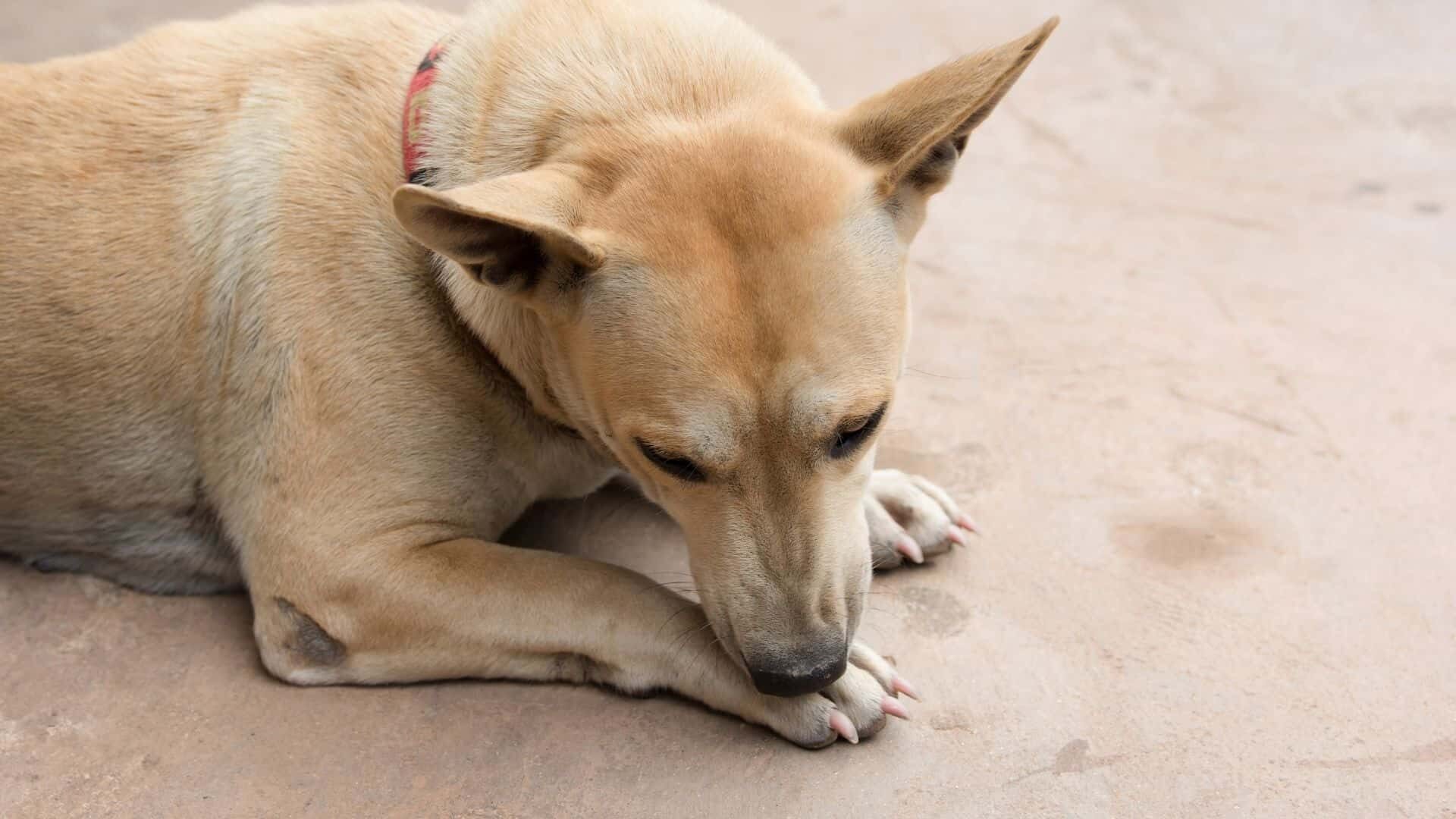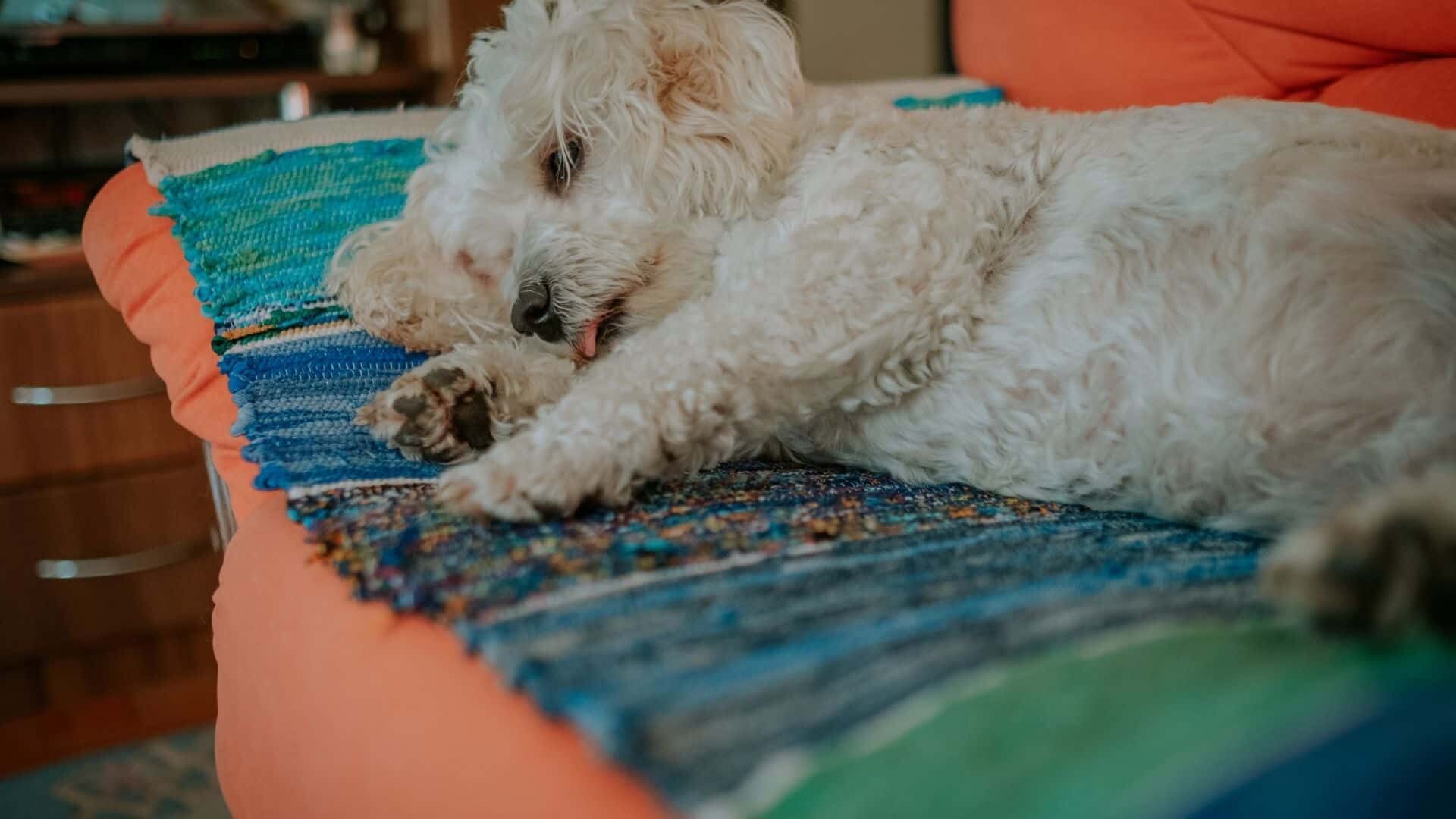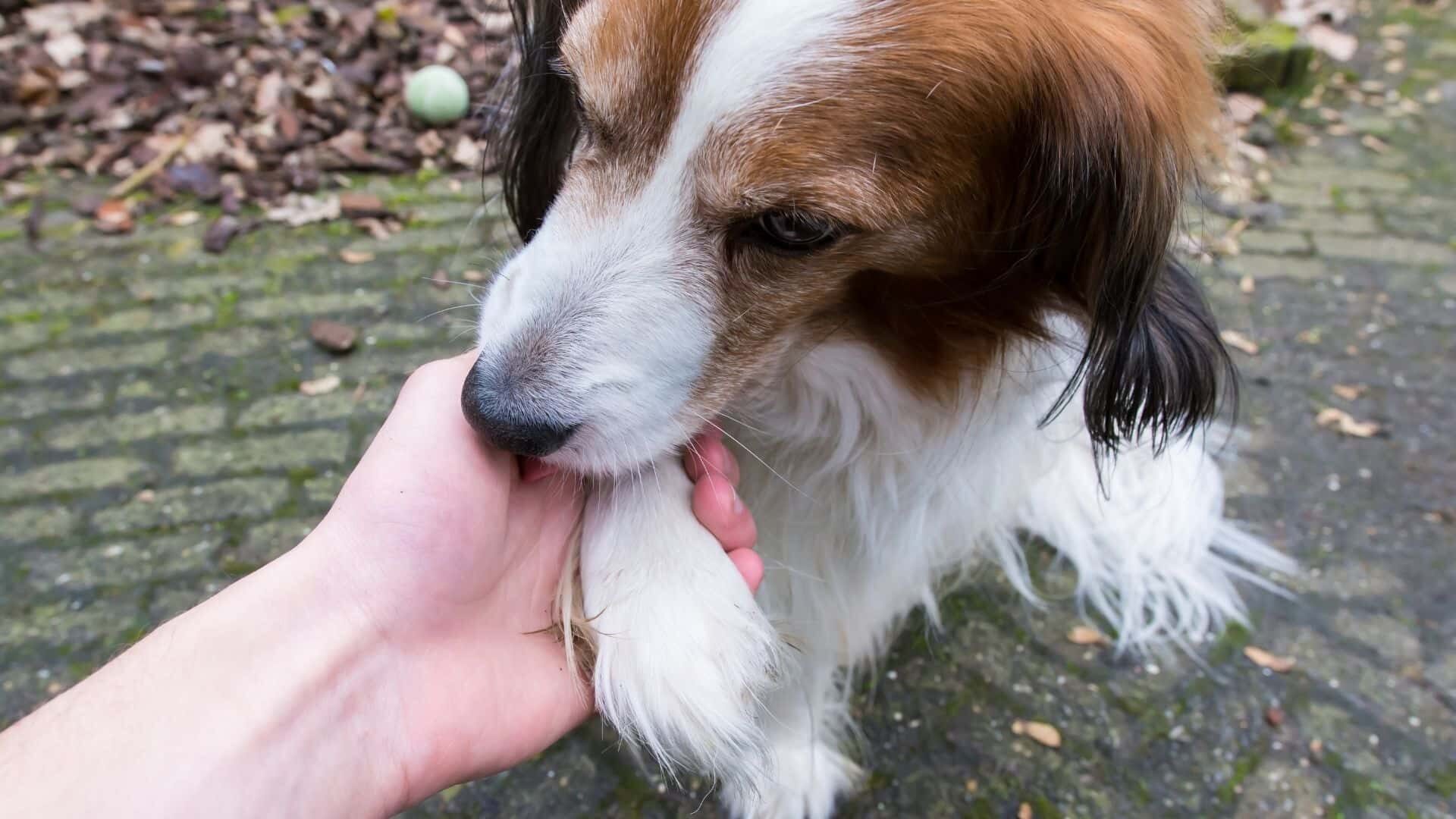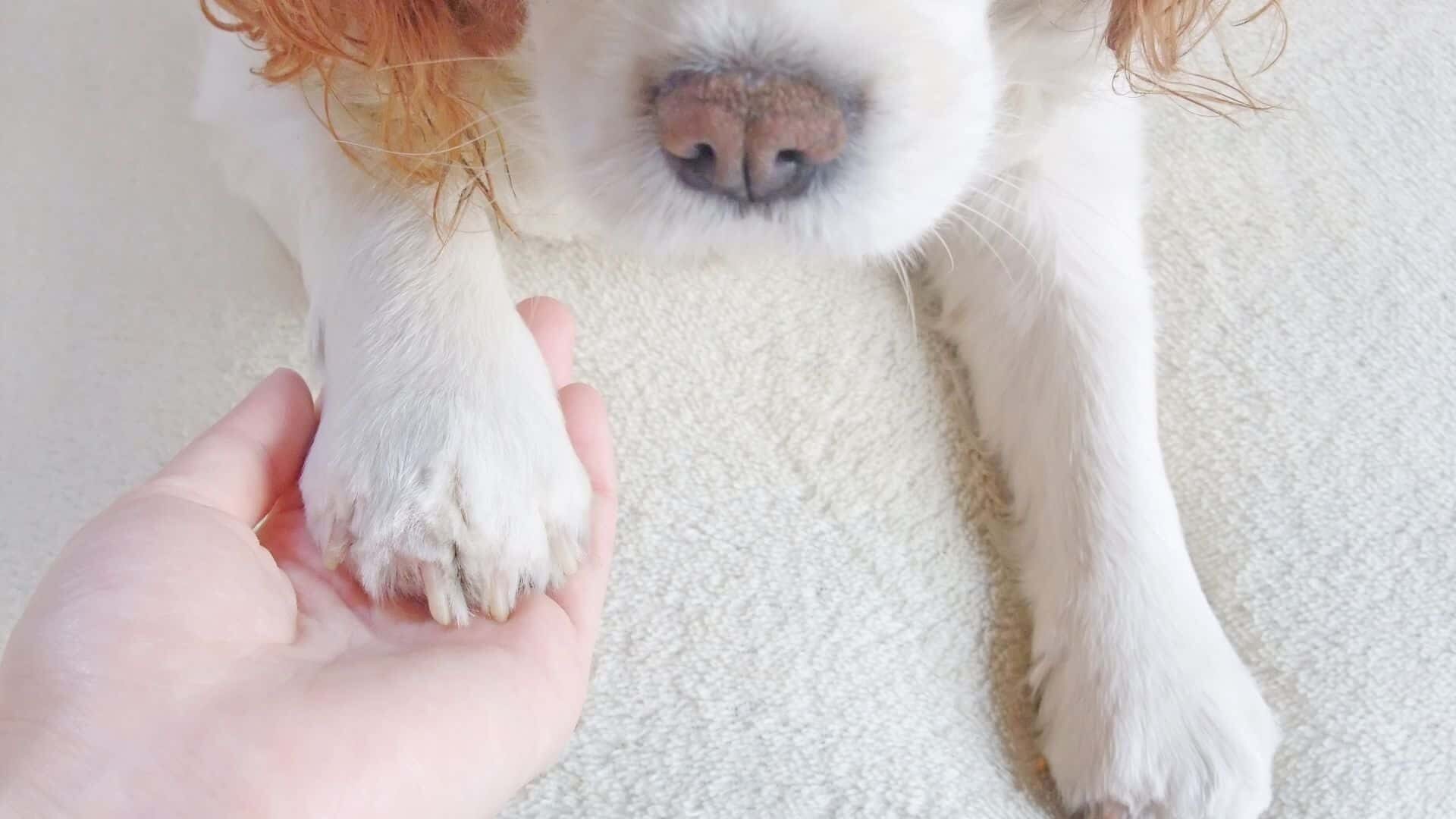Grooming our pet dogs on a regular basis keeps them physically clean. You’ll be horrified to watch your dog’s paws constantly and obsessively chewed on shortly after a bath or a grooming session.
Let’s have a look at the most crucial points first.
Itching, allergies, skin irritation, skin shortening, the dog is sensitive, or a past incision or wound may lead a dog to lick or gnaw its paws following a grooming session. Among the options are anti-itch shampoos, soothing balms, and consulting a veterinarian.
So, what are the possible causes of dogs licking or chewing their paws after a grooming session? What we can do to lessen the symptoms, if any, and whether or not it’s necessary to take the dog to the vet, among other things. Read on!
What causes dogs to lick their paws after a grooming?

People sometimes report that their dog’s skin becomes sensitive after going to the groomer, bathing him, or any other comparable activity. To make sure their pet isn’t in pain, responsible pet owners must deal with itchy, irritated skin that results from grooming and other activities. Find out what’s causing this issue, what signs to look for, and what you can do to fix it.
Grooming can cause irritation to a dog’s skin, especially when using electric clippers, scissors, or other mechanical devices. This is especially true in places such as the face, genitals, and anus, which are particularly vulnerable.
Electric clippers with dull or overheated blades can catch hairs, causing irritation and even burns. Compared to human skin, a dog’s skin is significantly thinner and more susceptible to irritation. If your dog continually licks the area, it can cause redness and irritation, but there are no evidence of cuts or blood.
Overly harsh shampoo or conditioners or conditioners that haven’t been adequately rinsed away might cause more diffuse skin irritation, as can excessive bathing or cutting hair too short. This can lead to sunburn of the skin. An infection or parasite infestation like fleas can be mistaken for it.
Grooming procedures, effort, and attention to detail may nearly always decrease or eliminate these issues. Changing the tools, treatments, or methods utilised may be necessary if they occur frequently.
There is a slew of possibilities here. If your dog hasn’t been groomed in a while, it may be more sensitive in regions that were previously covered with hair and mats. Dandruff and itching can be the result of using a shampoo that hasn’t been fully rinsed out of hair.
A minor abrasion can be caused by a hot or short blade, and dogs love to agitate these areas by nipping, licking, and scratching them constantly. It is possible that your dog has developed a moderate staph infection because it was exposed to airborne bacteria following a minor skin abrasion. Because your dog’s hair is shorter, it may have developed an allergy.
If the abrasion is growing worse despite your efforts to encourage the groomer to perform a better job, you may wish to consult your veterinarian. In my opinion, using a shampoo that has been appropriately diluted is better than rinsing your dog.
In order to get the most out of your shampoo, always dilute it to the manufacturer’s recommended strength, and then rinse well. And don’t forget to wash your dog’s face when you’re getting him a shower. It’s crucial to keep their faces clean, and a washcloth isn’t going to do the trick.
Is it okay if I don’t let my dog to lick his paws?
Paw licking is common in dogs, but excessive licking could be a sign of a more serious problem. The frequent foot licking can also lead to secondary infections (bacterial or yeast) as a result of the additional wetness.
When we notice even the tiniest of differences in our dogs, it is understandable that we become concerned.
As a result, if we see our dog paw-licking and chewing in an unusual manner just after a grooming procedure, we get worried. For the sake of our cherished pet.
When a dog is licking or biting on his paw, it may be because he is experiencing a typical reaction to anything. But it’s not always as simple as we thought when it comes to dogs licking their paws after being groomed.
Paw licking can be caused by a variety of things. We need to figure out why this is the case. Alternatively, a veterinarian should be consulted.
Early intervention for the underlying issue that’s driving your dog’s paw-nibbling behaviour will greatly simplify the process of resolving it.
You may also need to switch up your typical grooming spot from time to time. Due of the grooming center’s chemicals and equipment, we cannot allow our dog to become unwell.
If you’re using a new shampoo or conditioner, be sure to read the directions and watch the tutorials to learn how to properly wash and rinse your hair. Concerns about one’s health take precedence over all else.
Are dogs sedated by their groomers?

Groomers are prohibited from administering sedatives to dogs. In a veterinary hospital, the veterinarian has the authority to authorise sedation, which is administered by a veterinarian’s assistant or technician. For oral drugs given by a veterinarian, an owner can administer it to their pet an hour before their next grooming visit.
Dogs lick their paws after being groomed for a number of reasons.
Dogs may lick and chew their paws after a groom for a variety of reasons. It’s our responsibility as the business owner to figure out what’s going on here.
Swelling, limping, or smelling paws are all signs that the problem is more serious than normal and should be taken more seriously than they are.
7 Reasons why dogs lick their paws after grooming
The use of clippers, scissors, or other mechanical hair-cutting implements
Over the years, many pet owners have expressed concern about their dog’s skin becoming irritated following a grooming session.
1. Electric clippers, scissors, or other mechanical equipment
Also, electric clippers with dull or overheated blades might irritate a dog’s skin. This can encourage your sweet dog to constantly lick and chew on his paws, resulting in irritation and even inflammation in the affected area.
2. Irritants and allergens
It is possible for your dog to be exposed to several pollens, spores, mites, and other environmental allergens depending on where you reside. Paw itching is an indicator of environmental sensitivity because your dog’s paws are continually in contact with surfaces where allergens can land. An itching allergic reaction on the skin or paws may be caused by food allergies.
3. Dry skin can occur (itchy)
Dogs’ dry skin is frequently the result of overzealous bathing and brushing. This passion for cleanliness may be the cause for the number of times our pets are bathed or groomed.
Skin dryness makes dogs’ coats itchy, especially on their paws, which are in constant contact with the ground.
They also deplete their skin’s natural oils while using shampoos and detergents. It causes itching on the skin. Hence, the reason why our dog has such an extreme reaction when he gets a bath.
4. Brush burn
It’s not always obvious when a dog has sensitive skin because it may not show signs of it. Repetitive brushing in the same area, whether there are tangles or matting, can burn sensitive skin when it is done in a salon setting.
5. Razor burn
Razor burn occurs when an area of delicate skin is shaved very close to an area that has already been burned by a brush. Matting or cleaning a dog’s sanitary area may be to blame. In other cases, it can be caused by using a razor that is too hot or dull while shaving through thick, matted hair.
6. Dermatitis
Skin conditions (dermatitis) can cause a dog to lick itself, which can be caused by bacteria, allergies, or food sensitivity. An allergic reaction to chemicals used in your yard or deicing solutions could cause dermatitis in your dog. When you get home, have a bowl of water and a towel handy for wiping your dog’s paws clean.
7. Yeast infections
One of the most prevalent fungal infections that affects dogs is yeast dermatitis, which can be found between the paw pads. An overproduction of innocuous yeast cells causes a yeast infection, which is exceedingly irritating. A secondary bacterial infection can be caused by licking itching paws, making the skin even more inflamed and requiring antifungal medicine to treat.
Rancid, rotten-smelling skin is one of the most telling signs of a yeast infection, along with itching and irritation. Like Bulldogs and Pugs, these dogs have a higher risk of developing an infection because of their many folds of skin.
How to prevent your dog from licking their paws?

Before attempting to change your dog’s paw-licking behavior, it’s crucial to figure out why it’s happening.
You should always consult your veterinarian if you have any questions about your pet’s health (such as anxiety, hormonal imbalances, or dermatitis). Paw licking should stop after the underlying health condition is addressed.
- It may be more convenient to hide lick granulomas if they are left alone. Distracting your dog with chews, games, or a simple command is possible if you can keep an eye on him.
- There are a lot of things you may do if you’ve ruled out medical causes and you’re concerned that your dog is anxious or bored.
- If you can, get help from a force-free behaviourist if possible. They will be able to shed light on why your dog is licking its paws.
- It is possible to desensitise and counter-condition your dog’s response once you have discovered the triggers.
- Barriers can be put up in the home if we believe that separation is causing the anxiety. This will teach your dog to be independent of you when you’re not around.
- There is a barrier between them and you, yet they can still see and hear you. In the beginning, this barrier condition can only be used for 30 minutes at a time.
- Interactive toys or chews can be introduced from one side of the barrier to the other. You’re teaching them that being away from you isn’t as horrible as they thought!
- It is important to take quick action if your dog shows any of these indications of irritated skin after a recent grooming, whether done professionally or at home. Oatmeal dog shampoo and a room-temperature bath might help soothe a dog’s sensitive nerves. In the near term, this should aid your pet. Dogs and cats can also benefit from bug bite ointments, which are commonly found in pet stores, veterinarians, and groomers.
In the long run, it’s time to make some adjustments to your grooming regimen. Make sure to ask the groomer what blade they are using and have them go up a few numbers if your dog suffers this skin irritation after having their hair cut with electric clippers, for example. Try a different shampoo or conditioner the next time if it develops after a bath, especially if you are using a new one.
Shampoos and conditioners for sensitive skin that are hypoallergenic and extra mild are easily available. When drying your dog off after a wash, use a dog dryer instead than a human hair dryer. Even on low heat, a human hair dryer can cause irritation and burns on your dog’s skin.
All of these measures can be taken by you or your groomer to avoid future cases of sensitive or inflamed skin. Dogs with sensitive skin should not have their hair too short or be bathed too frequently, since this can lead to irritated skin, especially in delicate regions of the body.
Watch Dog excessive paw licking: stop it with natural recipe | Video
My dog’s skin is itchy after a bath, what can I do to help it?
Medicated anti-itch baths or creams should be used to treat your dog’s itchy skin by them or another groomer. There are a variety of medicated dog shampoos and anti-itch sprays available at pet supply stores and online, so you don’t have to leave the house.
What happens to dogs after a bath?
They may feel unhappy and uncomfortable during their grooming sessions. … When you bring your pup home from a grooming session, he may crouch in fear or appear to be quite dejected.
What can I use to keep my dog from licking his paws?
· Dog paw licking home remedies
· Apply apple cider vinegar mix to your dog’s paws
· When cleaning with baking soda, soak the item in the solution for about an hour
· Infuse oatmeal into paws
· Make use of coconut oil
· Check your dog’s nutrition
· Is your dog’s shampoo stale?
· Bathe with some chamomile oil
· Pesticides can be used to control pests
What is the purpose of my dog’s constant licking?
Dogs may lick or chew their paws for a variety of reasons, just like other canine activities. Injuries, skin disorders, allergies to parasites and food, and boredom or worry are among the most common causes of a dog’s discomfort.
Why does my dog keep licking his own face after a bath?
It sounds as if he’s experiencing some discomfort in this region. In rare cases, this can be the result of skin irritation from the clippers (if his back was shaved), an allergic response to the shampoo or other grooming chemicals, or even an issue with the dog’s anal gland, which frequently leads dogs to behave in this manner.
Conclusion

Grooming procedures such as diligence and care can reduce or eliminate dogs’ tendency to lick and chew their paws after being groomed. They could necessitate changes in devices, treatments, or methods used. After a while, a dog’s proclivity for licking and chewing on its paws fades.
Your knowledge base on “Why do our dogs chew and lick their paws after we’ve groomed them, and how can we prevent this?” has been amply replenished. So, take care of your dog and keep him or her happy and healthy.
Bottom up
Please comment below about your ideas and share this “Why Do Dogs Lick Their Paws After Grooming: Guide to Prevent” article with your friends.
Stay tuned with our website to find out more exciting stuff. Don’t forget to check out our previous articles too.
Until the, Read about, Why Is My Dog Peeing in His Sleep: 8 Reasons and Solutions





